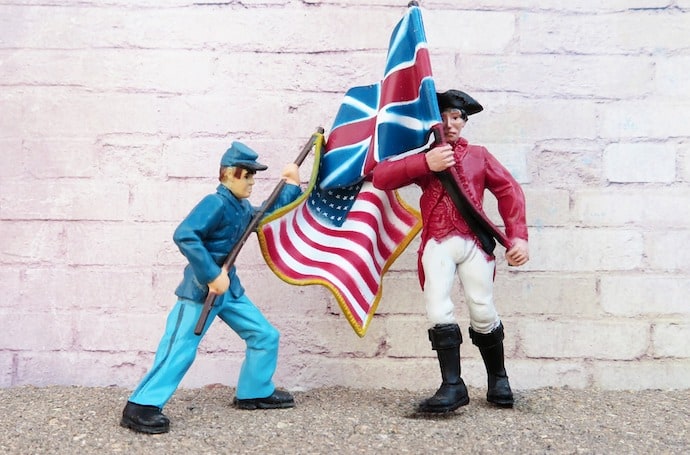The BBC website published a popular article a few weeks ago discussing the increase in the use of British English phrases in the USA. George Bernard Shaw once wrote that Britain and America are “two countries separated by the same language”, but the reason the British love this type of article is that they like to think they have the upper hand when it comes to language; that the English language is the sole reserve of the English people.
However, history shows that this opinion is very much missing the point. The accent considered nowadays as ‘correct’ English, Received Pronunciation (RP), is in fact a relatively recent development. In fact, many of the founding colonists would actually have spoken in a manner quite similar to today’s North American east coast accents. Take, for example, the word herb: until around the late-19th or early-20th century the letter ‘h’ was rarely pronounced in British English. Thus, at the time of the colonies’ founding, the word herb was pronounced erb in the British Isles. Similarly, the American seasonal fall was previously widely used in the British Isles and the origins of autumn are actually rather misty.
Indeed, in the 1790s it was reported that naval officers found it so difficult to determine whether a sailor was British or American that the Americans considered providing certificates of citizenship.
So Shakespeare wrote in American English?
After the American revolution there was a determined effort to draw a distinction between those from the new world and those from the old world, as well as to integrate immigrants under one nation. To this end, Noah Webster wrote not only a dictionary with his own simplified spellings but also a book of pronunciation. It was Webster’s plan to simplify the language and to have a universally-correct pronunciation. So Webster is responsible for altering the spelling of, for example, the British centre to the American center, and added the ‘zee’ to the end of words such as civilize.
A schoolbook versus the Bible
Webster’s Blue-backed Speller is arguably one of the most influential books on the development of the English language. As a schoolteacher, Webster found that everyone could pronounce the monosyllables easily enough, but not so with the polysyllabic words. To aid this he wrote page after page of words broken down into simple monosyllabic phrases.
C.E.M. – cem E. – e T.E.R. – ter Y. – y. Cemetery
One can easily see how this example provides Americans with their distinctive pronunciation: whereas those from the ‘old world’ might commonly pronounce “secretary” as secre-tray Americans respect all the vowels with secre-tary.
Let’s just moov on
So which side of the Atlantic is right and which side is wrong? This author doesn’t believe either side has the etymological upper hand. Language exists and constantly evolves as a means of expression and communication; to learn that the words must be pronounced after a specific manner is to miss the point. However, the habit that many British adopt of looking down on American pronunciation, spelling and usage as being a corruptive influence on their baby is equally irrelevant. As both sides found out 240 years ago, revolution happens when you stand in the way of evolution.
Further reading:
The Cambridge History of the English Language (Google Books)
Cover image via MaxPixel (CC0)

Ein Kommentar zu “The Chattering Classes”
So the American pronunciation of Herb or use of Fall are right because it’s the ancient approach. And the American spelling of Center is right because language has to change.
I’m not a fan of Webster. I think his plan was a good one, that the English language would benefit from a bit of standardi(s/z)ation, and then was a great time to do it.
But he didn’t do a very good job, omitting some changes that would have added consistency (Labor, Honor, Glamour; Traveled, Jeweled, Excelled, Fulfilled; Aluminum, Radium) and adding others that were ignored for going too far. For example, Webster would have liked you to write:
“It made my hed ake watching the wimmen spunge their tuf bred into their soop.”
Regarding harvest-time, the Online Etymology Dictionary says Fall arose around the 1660s, whereas Autumn is from the 16th Century.
http://www.etymonline.com/index.php?term=fall&allowed_in_frame=0
http://www.etymonline.com/index.php?term=autumn
The American pronunciation that baffles me is that of French two-word phrases, such as ‘Grand Prix’ or ‘Papier-mâché’ In each case they Anglicise the first word and keep the second sounding French.
Sacrebleu! Or as they might say in America, “Sacred Blur!”